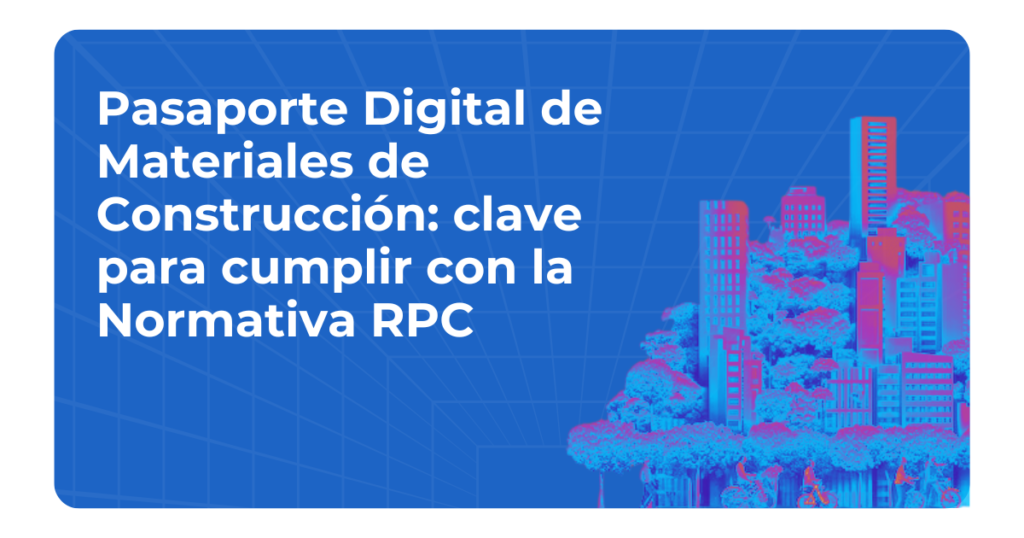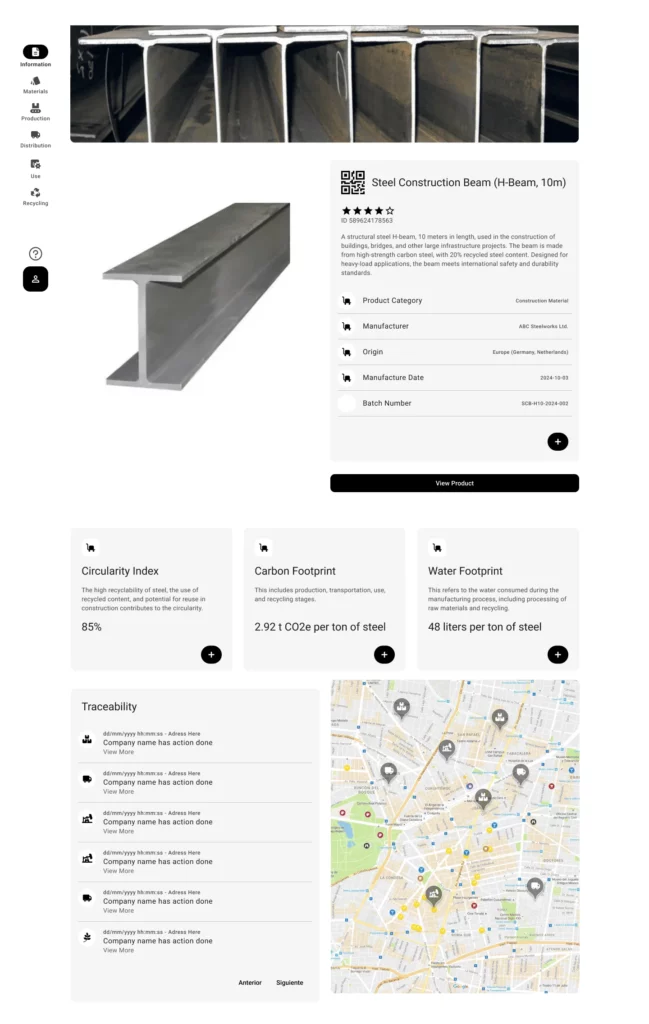

Digital Passport for Construction Materials: A key driver for compliance with the RPC Regulation
Digital Passport for Construction Materials: A key driver for compliance with the RPC Regulation
The construction industry is undergoing a profound transformation. With the approval of the new Regulation (EU) 2024/3110, the European Union takes a decisive step towards a more sustainable, digital and efficient model.
The new regulation primarily seeks to harmonize technical, environmental, and safety criteria for construction products. It also introduces key elements to facilitate the ecological transition, such as: Digital Product Passport (DPP)This digital document will be mandatory for many products starting in 2026 and will serve as a basis for ensuring traceability, transparency, and access to essential information throughout the product's lifecycle.
The DPP will include data on the composition, origin, carbon footprint, and reuse or recycling potential of each material. Thus, it becomes a fundamental tool for promote the ecodesign, optimize the use of resources and reduce the environmental impact of the built environment.
This new regulatory approach aligns with the principles of the circular economy, where the materials are not discarded at the end of their useful life, but are reintegrated into the productive system. The commitment to sustainability is reinforced through the use of verifiable, accessible and shared data between all actors in the value chain: manufacturers, designers, promoters and competent authorities.
The Digital Product Passport is not just a regulatory requirement. Above all, it is a strategic tool for moving toward smarter, more responsible construction, prepared for the environmental challenges of today and tomorrow.

What is the Digital Construction Materials Passport?
What is the Digital Construction Materials Passport?
The Digital Construction Materials Passport is a digital document that compiles detailed and structured information about the materials or products used in construction. This passport acts as an "identity card" for the product and accompanies it throughout its entire useful life.
It contains essential data, such as the origin of the materials, their chemical composition, the energy consumption during their manufacture, their durability, their carbon footprint and their possibilities of repair, reuse or recycling. Thus, offers a complete view of the environmental impact of the product, from design to the end of its life cycle.
One of the technologies that can strengthen the reliability of the DPP is the blockchain technology. This technology allows the information of each product to be recorded in a decentralized, secure, and unalterable manner. Thanks to this, every change in data is tracked and verified, which strengthens transparency between manufacturers, distributors, developers, and authorities. In addition, blockchain facilitates more agile audits and reduces the risk of fraud or manipulation of technical documentation.
The ultimate goal of the DPP is clear: to promote eco-design, boost sustainability, and allow every material to be part of a circular economy model. Contrary to the traditional linear model (make, use, dispose), the digital passport promotes an approach where resources remain in circulation, preserving their value for as long as possible.
This system provides transparency and trust. Both companies and end users will be able to access verifiable data and compare materials using objective and measurable criteria. In this way, the DPP becomes a key tool for more ethical and efficient construction, aligned with current market and environmental demands.
Direct relationship with the RPC Regulations
Direct relationship with the RPC Regulations
The Digital Product Passport (DPP) It is not an isolated or voluntary solution. On the contrary, it was born as a key element within the new European legal framework that regulates the construction market. We are talking about the Regulation (EU) 2024/3110, also known as the current RPC RegulationsThis update, adopted in November 2024, replaces the 2011 regulation and responds to the need to address the industry's environmental and digital challenges.
One of its main new features is the mandatory DPP for certain categories of construction products starting in 2026. This includes materials with a high environmental impact, such as concrete, steel, and insulation. The regulation requires these products to incorporate a digital system that allows their technical, environmental, and safety characteristics to be documented in a standardized and accessible manner.
Additionally, the DPP will serve as the official channel for complying with the new environmental reporting obligations required by the RPC Regulation. This involves including information such as the carbon footprint, energy consumption in the manufacturing process, product durability, and its reusability or recycling capacity. In this way, the digital passport becomes an essential tool for applying the principles of the ecodesign and move towards a real and measurable circular economy.
This transformation is fully aligned with the European Green Deal, which requires productive sectors to reduce their emissions and transition toward more sustainable production models. Therefore, the DPP not only responds to a technical requirement, but also to a political and social commitment that seeks to build a climate-neutral future.
What information does a DPP contain?
What information does a DPP contain?
The Digital Product Passport (DPP) is not a simple technical document. Rather, it is a living data platform that accompanies each construction product throughout its entire lifecycle. From manufacturing to eventual recycling, the Digital Construction Materials Passport centralizes critical information in a standardized digital format, easily accessible by any interested party.
Typically, the DDP includes data grouped into several key categories:
General product information
It contains the product name, batch number, date of manufacture, estimated shelf life, and conditions of use. It may also include details such as the warranty or the responsible manufacturer.
Composition and origin of materials
This section details the product's components, their origin (country or supplier), and the proportion of recycled or recyclable materials it contains. This section is essential for assessing the product's sustainability and compatibility with circular economy models.
Environmental indicators
It includes the carbon footprint associated with its manufacturing, transportation, installation, and use. It can also provide data on energy consumption, water resource use, and emissions of toxic compounds. This data allows for calculating the product's total environmental impact and making decisions based on eco-design and emissions reduction criteria.
Ability to be repaired, reused or recycled
The DPP must reflect the ease with which the product can be disassembled, replaced, or recycled at the end of its useful life. This section is especially relevant for projects seeking environmental certifications or those pursuing selective deconstruction and reverse logistics strategies.
Certifications and regulatory compliance
Available certifications (such as EPD, CE, BREEAM, or LEED) are included, as well as compliance with the requirements of the CPR Regulation. This information facilitates the work of auditors, designers, and developers when validating the use of materials in compliance with European legislation.
Product history and relevant events
Some DPPs also store information on repairs performed, parts replaced, or product transfers. This type of traceability is especially useful for long-lasting materials or those with residual value at the end of the project.

Ultimately, the DPP enables decisions to be made based on a solid, up-to-date, and verifiable database. This reduces uncertainties, optimizes maintenance, and promotes more efficient, safe, and responsible construction. Furthermore, it offers manufacturers and suppliers a way to differentiate themselves through transparency and continuous product improvement.Ultimately, the DPP enables decisions to be made based on a solid, up-to-date, and verifiable database. This reduces uncertainties, optimizes maintenance, and promotes more efficient, safe, and responsible construction. Furthermore, it offers manufacturers and suppliers a way to differentiate themselves through transparency and continuous product improvement.
Benefits of DPP in construction
Benefits of DPP in construction
The Digital Passport for construction materials not only meets a legal obligation within the framework of the RPC Regulation. It also represents a strategic tool that can generate competitive advantages throughout a project's entire lifecycle. From planning to the end of a building's useful life, the benefits of the DPP are numerous and evident.

Transparency and traceability
The DPP provides a single, standardized source of information. Thus, all stakeholders in the construction process—manufacturers, designers, construction companies, and end customers—can access the same data, without ambiguity. This reduces errors, improves coordination, and facilitates quality control.

Simplified regulatory compliance
Having an updated DPP allows companies to easily comply with the new requirements of the CPR Regulation, as well as other European frameworks related to the European Green Deal and ecodesign. This avoids the risk of sanctions, delays, or exclusions from public procurement processes.

Sustainability and circular economy
The DPP promotes informed decisions that favor the use of recyclable, reusable, or low-carbon materials. This allows not only for the design of more sustainable buildings, but also for planning their future deconstruction. Therefore, we are moving toward a true circular economy model, in which waste is transformed into resources.

Maintenance and operations optimization
By including information on durability, maintenance, and component replacement, the DPP facilitates building management during use. It also reduces operating costs and improves the efficiency of preventive and corrective maintenance tasks.
The Digital Passport for construction materials transforms the way construction materials information is managed. It's not just about complying with the law, but also about building better: with more data, greater accountability, and a strategic vision for the future of the sector.

The Digital Passport of Construction Materials It represents much more than a regulatory requirement. It is a key tool for transforming the way the construction sector manages information, ensures the traceability of materials, and actively contributes to the sustainability goals established by the European Union.
In the context of the new Construction Products Regulation and aligned with the principles of the European Green Deal, the DPP is positioned as a fundamental pillar for integrating ecodesign and moving towards a real circular economy model. Its adoption will allow companies not only to comply with the RPC Regulations, but also to position themselves as leaders in responsible innovation, operational efficiency and environmental transparency.
Certainly, implementing the DPP can present challenges: from process digitization to cross-platform interoperability and team training. However, preparing now can make the difference between adapting late or staying ahead in an increasingly demanding and regulated market.
CircularPass: digital passports for the construction industry
At Blue Room Innovation We are prepared to accompany you in this process. We help manufacturers, developers, and construction companies implement digital solutions to comply with European regulations, ensure material traceability, and generate sustainable value from product design to end-of-life.
Do you want to know how to integrate the Digital Construction Materials Passport into your construction processes in an agile and efficient way?
We have already successfully applied this methodology in projects such as CircularPassa digital product passport developed in collaboration with major players in the recycled steel sector, such as Celsa Group.
We are waiting for you! Will you join the project?
Products
Digital Product Passport
Descentralized platforms
Descentralized Identity
Verificable Credentials
About us
Team
Methodology
Our Mission
Connect
Cristòfol Grober 4, local 35
17001 - Girona
info@blueroominnovation.com
Follow us
Copyright © 2024 Blue Room Innovation Privacy Policy - Legal Warning - Cookies Policy